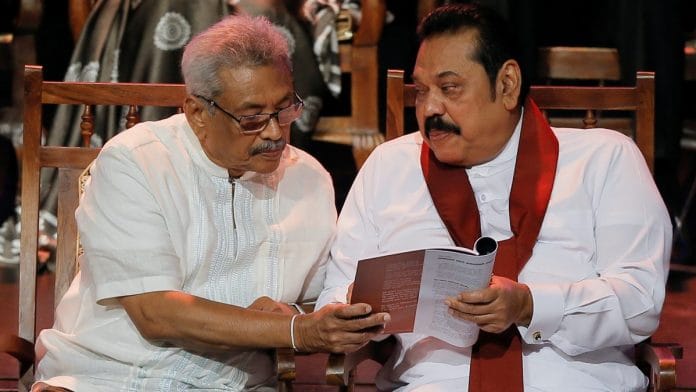Sri Lanka’s 2019 presidential election has brought bad news. Gotabaya Rajapaksa as President and elder brother Mahinda Rajapaksa as Prime Minister will try to undermine the fragile democratic gains Sri Lanka made in recent years.
The Rajapaksa brothers know how to bend institutions and undermine democracy. Mahinda Rajapaksa’s presidency revolved around nepotism, corruption, authoritarianism and a consistent contempt for the rule of law. The Rajapaksa brothers are ruthless, power-hungry and experienced in running the country with an iron hand. Sri Lanka is in for some extremely rough time ahead.
Possible attempt to amend constitution — once again
Mahinda Rajapaksa, an alleged war criminal and a deeply committed authoritarian who crushed the Tamil Tigers, has already indicated that revisiting the 19th Amendment to the constitution would be a priority. The amendment had weakened presidential powers in Sri Lanka. Eventually, the Rajapaksa brothers may be able to either repeal the amendment or essentially make significant modifications to it.
Passed in 2015, the 19th Amendment also strengthened the office of the Prime Minister, and reintroduced two-term limits for the presidency. The amendment was a response to the 18th Amendment that Sri Lanka’s Parliament had passed in 2010, when Mahinda Rajapaksa was the president. That Amendment greatly expanded presidential powers, including eliminating term limits, allowing Rajapaksa to contest for an unprecedented third term in 2015.
Also read: A Rajapaksa for President. For Sri Lanka that has seen so much tragedy, it’s time to panic
Harping on Sinhalese-Buddhist nationalism
The Rajapaksas, as ever, will adroitly use the Sinhalese-Buddhist nationalism plank to further their agenda. Ethnonationalism is a key aspect of the Rajapaksa project and was effectively wielded during the presidential campaign. Gotabaya Rajapaksa won because of overwhelming support from the ethnic Sinhalese. He ran on a campaign that largely promulgated national security and Sinhalese-Buddhist nationalism. As expected, his message resonated strongly with the majority community.
Now his presidency too will pursue a Sinhalese-Buddhist agenda aggressively. Ethnic and religious minorities like Muslims and Tamils are, quite understandably, worried about what’s going to happen under another Rajapaksa administration.
The return of the dreaded brothers
In the coming weeks, it would not be surprising to learn about increased surveillance of human rights defenders, civil society activists or common Sri Lankans, especially in the northern and eastern provinces of the country. There’s also the heightened possibility of NGO offices being visited or even raided by police or military personnel.
Intimidation, threats, and violence were rampant in the previous Rajapaksa regime. More generally, anti-minority violence will almost certainly increase; if that happens, don’t expect the administration to condemn it. There are numerous other reasons to be concerned about the return of the Rajapaksa brothers. The bottom line is that the family isn’t going to deviate from its undemocratic ways.
Also read: Be it Shavendra Silva or Rajapaksa, Sri Lanka’s love for ‘war criminals’ runs deep
The Rajapaksas are here to stay
Forthcoming parliamentary polls – we still don’t know when they will be held – are probably the last thing that could slow the Rajapaksas down – at least for now. If, for example, the Rajapaksas and their allies fail to get a parliamentary majority, it would be a significant setback. It wouldn’t just limit or curtail Mahinda Rajapaksa’s ability to retain the PM’s chair, but it would also undermine the family’s mandate and hinder its ability to take firm control of Sri Lanka.
However, a scenario where the Rajapaksas won’t do quite well in parliamentary elections is unlikely. The most plausible outcome will be one where the parliamentary vote has strengthened their hand and ensured that they have a firm grip on the state machinery for the foreseeable future.
The author is an Adjunct Fellow at Pacific Forum. Follow him on Twitter @taylordibbert. Views are personal.







All of Rajiv Gandhi’s killers were baptized Christians.
this is a global trend – no country is immune to it. why pick on sri lanka – a dot in the world . pick on the bigger authoritarian scoieties and the so called democratic ones
IF PERSECUTION OF TAMILS RESUMES TODAY’S INDIA WILL NOT EVEN BE ABLE TO EVEN RAISE HER VOICE LEAVE ALONE RENDERING ASSISTANCE AS WAS DONE UNDER BOTH INDIRA GANDHI & RAJEEV GANDHI
Why is the West worried about sham word democracy? Secondly, Muslim is not ethnic word. Sri Lanka don’t have Muslim but converts.
AS PER WELL READ AND SAVVY INTELLECTUALS INCLUDING MOSLEM INTELLECTUALS WITH NO AXE TO GRIND MORE THAN 95% OF THE SUB-CONTINENTS’S MUSLIMS ARE CONVERTS . CAN ANY MODERN STATE ABET,ENCOURAGE AND INCITE PERSECUTION OF NON -ETHNIC /CONVERTED MINORITIES? IF THAT IS SO THE INDIVIDUALS HELMING SUCH STATES MUST BE KEPT OUT OF POWER